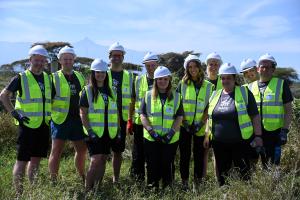Empty Spaces Partners
The Empty Spaces Partners page showcases the organizations and individuals supporting the project’s mission across Europe, with a focus on Poland and Great Britain.
Resources
The Resources page offers a curated collection of materials, guides, and tools to support and inform the Empty Spaces to Homes project.
Empty Spaces News
Empty Spaces News is the official hub for updates, articles, and insights on the project’s progress, featuring developments from both Poland and Great Britain.
Habitat for Humanity and United Cities and Local Governments in Africa (UCLG) Africa partner for sustainable urbanization
Cairo, Egypt — On the sidelines of the 12th World Urban Forum (WUF12), themed “It All Starts at Home: Local Actions for Sustainable Cities and Communities,” Habitat for Humanity Africa Area Office and United Cities and Local Governments of Africa (UCLG Africa) signed a Memorandum of Understanding (MoU) to promote affordable housing, sustainable urban development, and climate resilience across Africa.
Cairo, Egypt — On the sidelines of the 12th World Urban Forum (WUF12), themed “It All Starts at Home: Local Actions for Sustainable Cities and Communities,” Habitat for Humanity Africa Area Office and United Cities and Local Governments of Africa (UCLG Africa) signed a Memorandum of Understanding (MoU) to promote affordable housing, sustainable urban development, and climate resilience across Africa.
The MoU was signed by UCLG Africa Secretary General Ambassador Jean-Pierre Elong Mbassi and Habitat for Humanity International Vice President of Program Effectiveness, Luis Noda, in the presence of Ambassador Mohamed Higazy, Director of North Africa Regional Office, UCLGA, Daphney Nkosi, National Director at Habitat for Humanity South Africa, and Grace Ananda, Policy and Advocacy Manager at Habitat for Humanity Africa Area Office, among others.
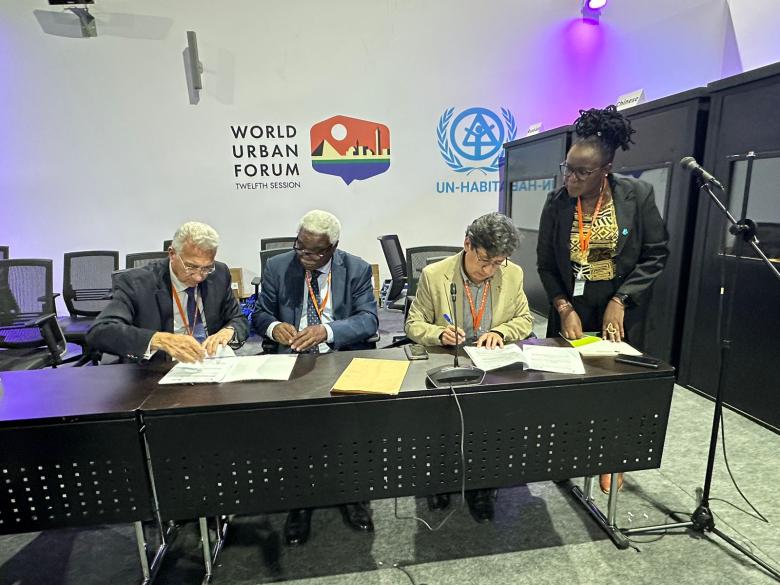
From left to right: Amb. Mohamed Higazy, Amb. Jean-Pierre Mbassi, Luis Noda; and Grace Ananda during the signing of the agreement.
The MoU outlines our shared commitment to fostering safe, resilient, and inclusive urban spaces through initiatives that support affordable housing, strengthen local governance, and enhance climate resilience, especially through the Building Climate Resilience with the Urban Poor (BCRUP) program. Key areas of collaboration for this partnership include:
- Knowledge sharing: The partnership will focus on developing tools and resources to support affordable housing and sustainable urban living, including BCRUP implementation, slum transformation, tenure security, climate change, infrastructure development and emergency response.
- Advocacy: Promoting awareness of sustainable housing solutions and secure tenure, as well as showcasing best practices to foster socially, economically, and culturally inclusive urban communities. This will also include the engagement of HFHI within the Home Equals Campaign.
- Capacity building: Strengthening technical skills for stakeholders in the housing ecosystem—governments, private sectors, local entrepreneurs, and civil society—aimed at advancing affordable housing solutions.
- Local engagement: Supporting projects that address issues such as climate adaptation, land tenure security, and health impacts within communities.
- Resource mobilization: Collaborating on funding efforts to support the BCRUP initiative and other joint activities at various levels.
- Convening stakeholders: Facilitating engagement within the housing ecosystem around green social housing efforts, including organizing webinars and symposia.
- Coalition participation: Enhancing involvement in strategic coalitions like Cities Alliance and housing forums to support funding and partnership opportunities.
- Regional and national collaboration: Encouraging closer cooperation between Habitat for Humanity and UCLG Africa’s offices to tackle urbanization challenges collectively.
- Climate action: Committing to initiatives that help communities mitigate and adapt to climate impacts.
The MoU outlines our commitment to fostering safe, resilient, and inclusive urban spaces through initiatives that support affordable housing, strengthen local governance, and enhance climate resilience.
This MoU marks a significant step towards achieving the New Urban Agenda and reinforces Habitat for Humanity’s commitment to empowering communities across Africa. Together, we aim to drive impactful change for a sustainable, resilient future.

Habitat for Humanity and United Cities and Local Governments in Africa (UCLG) Africa partner for sustainable urbanization
NOVEMBER 14, 2024
AFI and Habitat for Humanity partner to expand sustainable housing finance
The Alliance for Financial Inclusion (AFI) and Habitat for Humanity International’s Terwilliger Center for Innovation in Shelter recently agreed to collaborate for the promotion of inclusive, affordable and sustainable housing finance (IASHF). This strategic collaboration aims to generate valuable knowledge that will ultimately contribute to a more inclusive and sustainable financial ecosystem globally.
“AFI is committed to empowering policymakers to increase access and usage of quality financial services for the underserved through the formulation, implementation, and global advocacy of sustainable and inclusive policies.” says Dr. Alfred Hannig, AFI Executive Director
“We look forward to working with Habitat's Terwilliger Center to help the market develop new solutions for low-income populations.”— Dr. Alfred Hannig, AFI Executive Director
Complex challenges are found on both the supply and demand sides of sustainable housing finance. Supply side financing focuses on ensuring sufficient green, affordable housing materials and shelter solutions are available in markets where low-income people and vulnerable populations live and work. On the demand side, those populations need affordable and appropriate financing to purchase homes or, more commonly, for incremental building and home improvements. Products may include savings and loans, digital financial products, and insurance.
“Access to finance is an important factor in supply and demand, particularly in relieving people's constraints in the home improvement process: buying building materials and paying laborers, generally in the informal market.”— Patrick McAllister, Director of Finance, Policy, and Regulation at Habitat's Terwilliger Center.
“One big challenge is ensuring that banks and other financial institutions can accommodate informality in their lending systems.” adds Patrick McAllister, Director of Finance, Policy, and Regulation at Habitat’s Terwilliger Center.

Habitat for Humanity staff and AFI members stand with Professor Marja Hoek-Smit (center) after a masterclass on IASHF in Zanzibar, Tanzania
Marking the new collaboration, Terwilliger Center Advisory Board Member Professor Marja Hoek-Smit taught a master class it to representatives of ten central banks, which make up the AFI housing task force. The master class provided participants a solid foundational understanding of the role of a supportive enabling environment in promoting affordable housing finance — from macroeconomic stability to consumer protection. Held in conjunction with the recently concluded 40th annual African Union for Housing Finance (AUHF) conference in Zanzibar, Tanzania, the class was followed by the participation of task force members in a policy round table with ministers, representatives of Development Finance Institutions, and other public sector housing finance institutions.
“This is the Terwilliger Center’s first collaboration with AFI, and the feedback has been overwhelmingly positive. We look forward to working with AFI in the policy and regulatory space to ensure that the enabling environment for inclusive, affordable and sustainable housing finance is supportive of market actors, allowing them to serve low-income populations,” concludes McAllister.

AFI and Habitat for Humanity partner to expand sustainable housing finance
Habitat for Humanity and Miyamoto International partner to advance global housing resilience and disaster preparedness
Urban October 2024: Can Youth Innovation Solve the Most Pressing Challenges Facing Our Cities?
As we mark Urban October 2024, we find ourselves at a pivotal moment to reflect on the state of our cities and towns. This year, the World Habitat Day on October 7th, themed “Engaging Youth to Create a Better Urban Future,” and World Cities Day on October 31st, which focuses on “Youth Leading Climate and Local Action for Cities.” provides a unique opportunity to address pressing urban challenges while celebrating the innovative solutions led by young people.
More than half of the global population - around 4.4 billion people- reside in cities. This urbanization trend is projected to persist, with the urban population expected to more than double by 2050, when nearly 7 out of 10 people will live in urban areas. Therefore, the challenges of housing, climate change, and infrastructure demand innovative solutions led by today’s youth.
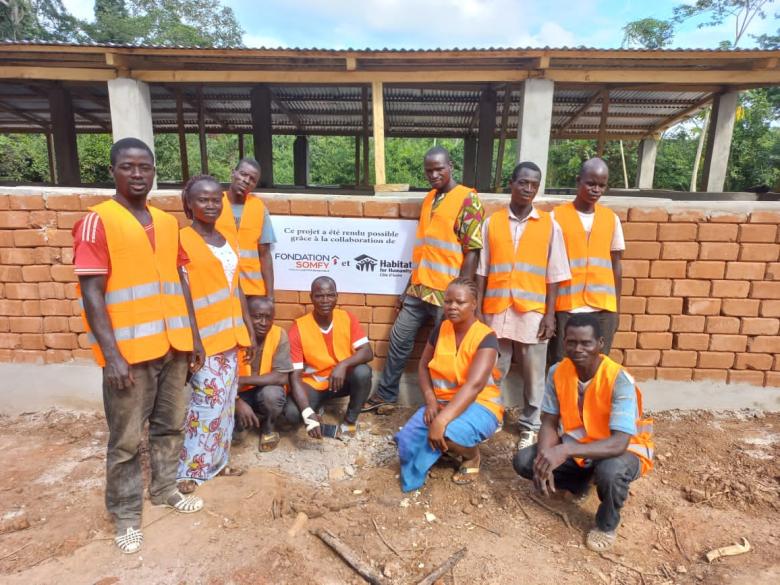
Youth cooperative supported by Habitat for Humanity Cote d’Ivoire
The Promise of Youth in Urban Development
With 60% of Africa’s population under 25, the continent’s youth are not only the future but the present architects of urban solutions. As our cities grow, they face immense challenges—ranging from inadequate housing and limited job opportunities to the mounting impacts of climate change and insecure land tenure. Yet, amid these challenges lies a wellspring of potential. Youth are not simply the leaders of tomorrow; they are agents of change today.
In my work with Habitat for Humanity, I’ve had the privilege of witnessing youth contributions to urban landscapes firsthand. In Malawi, for example, our programs empower young people through skills training in eco-friendly building techniques. Partnering with local governments, we involve youth in constructing climate-resilient homes, training them to make alternative energy sources like briquettes, and engaging them in tree-planting initiatives under the Home Equals Campaign .
Through training and advocacy platforms, we actively involve young people in volunteer programs that make a tangible difference in their communities.
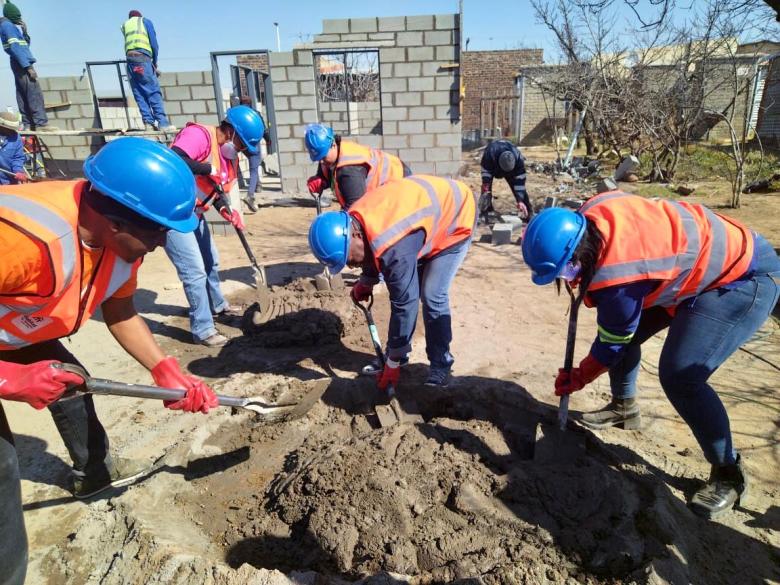
Volunteers during the annual Nelson Mandela Build held in June 2024, South Africa
In Ha-Ramabanta, Lesotho, our Youth Build program provides young volunteers with hands-on experience in constructing homes using sustainable techniques. This builds their confidence and empowers them to advocate for sustainable urban policies in their communities. In Kenya, our collaboration with local authorities has integrated housing initiatives into the national policy framework, advancing the Kenyan government’s commitment to affordable housing under its National Housing Policy.
In Uganda, Habitat for Humanity’s projects have engaged vulnerable communities, including youth, in providing sustainable water and sanitation solutions. By partnering with Uganda’s National Water and Sewerage Corporation, we’ve extended low-cost, clean water access to informal settlements in Kampala.
Additionally, our Terwilliger Centre for Innovation in Shelter in Kenya focuses on developing the local housing ecosystem, particularly through youth participation. By promoting alternative building technologies, such as interlocking stabilized soil blocks (ISSBs), we’re reducing construction costs and carbon emissions while equipping young artisans with skills that foster both innovation and sustainability in urban housing development.
ISSB trainee in Laikipia, Kenya
Habitat for Humanity recognizes that youth are pivotal in addressing housing challenges and driving sustainable urban growth. By working closely with local governments, communities, and young leaders, we are shaping cities where young people are not just beneficiaries but active architects of change.
These projects not only provide essential shelter but also equip youth with valuable vocational skills, aligning with the African Union’s Agenda 2063 and the New Urban Agenda , both of which emphasize sustainable development and inclusive urbanization.
Advocacy and Innovation: Empowering Youth Through Housing Solutions
Through our advocacy efforts, we have cultivated partnerships with governments, civil society organizations, and international bodies to implement housing related policies while engaging youths, young women and low-income earners.
The African Union’s Youth Engagement Strategy, for instance, mirrors our belief that including young people in urban development is essential for resilient cities. This initiative promotes youth involvement in policymaking, particularly in areas related to urban planning, governance, and climate action. Earlier this year, at the AU ECOSOCC meeting, I had the honor of leading a session focused on building resilient communities. Youth participation was a central theme, with discussions on peace, security, climate change, and land governance. During this session, I emphasized, “True resilience is achieved when we empower communities to participate actively in decision-making processes. The voices of women, youth, and marginalized groups must be heard at every stage.”
The voices of women, youth, and marginalized groups must be heard at every stage of decision-making.
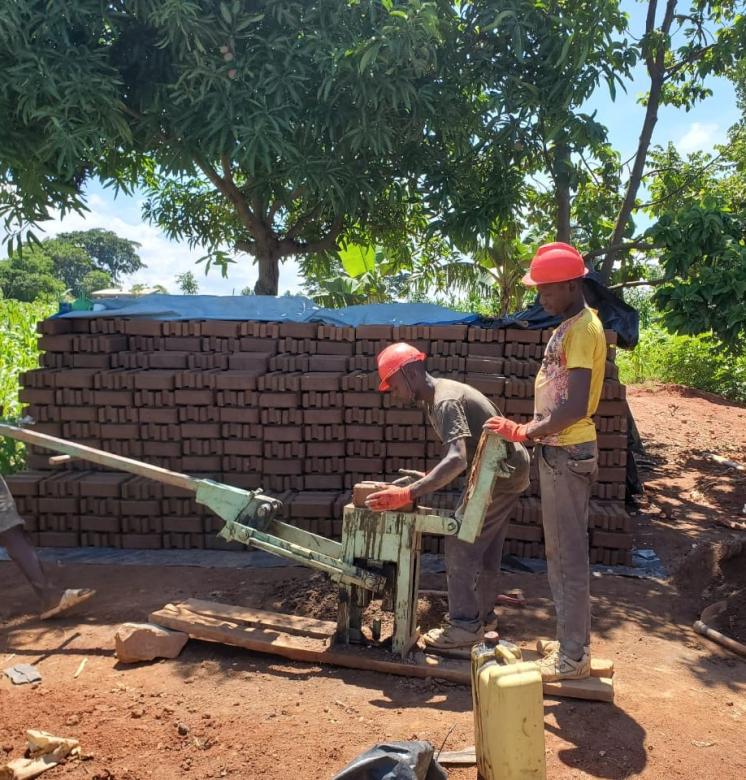
Youth engaging in ISSB production in Uganda
Youth Advocacy Through Creativity
Advocacy today goes beyond traditional platforms. Across Africa, young people use music, art, and social media to champion causes like land rights, climate resilience, and urban governance. For instance, during COP28 in Dubai, youth leaders used songs to amplify messages on climate action and land governance among other issues across the 17 SDGs.
During a visit to Habitat for Humanity Zambia, I interacted with youth who use the Participatory Approach for Safe Shelter Awareness (PASSA) to engage local government officials on land tenure security. One young woman remarked, “The skills and advocacy training provided by Habitat Zambia have equipped me to lead conversations on secure housing in my community. I have successfully encouraged more than 20 youth to participate in PASSA activities. They now know how to engage with local government officials on land tenure security.”
A Collective Call to Action
While the potential for youth-led urban development is vast, significant challenges remain. Limited access to education and employment opportunities often excludes young people from decision-making processes. However, despite these barriers, they continue to find creative ways to engage, using their talents to influence urban governance and climate policies.
The future of Africa’s cities rests in the hands of its youth. Together, we must ensure they have the resources, platforms, and opportunities to succeed. As Nelson Mandela wisely said, “There is no passion to be found in settling for a life that is less than the one you are capable of living.” Today’s youth have the passion, energy, and ability to create resilient, inclusive, and sustainable cities.
This Urban October, let us commit to empowering youth to lead the way toward a brighter urban future.
By Grace Ananda, Policy and Advocacy Manager- Africa Area Office.
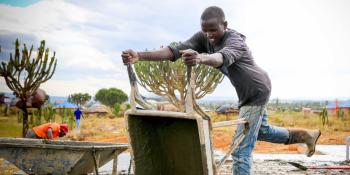
Urban October 2024: Can Youth Innovation Solve the Most Pressing Challenges Facing Our Cities?
Building a sustainable future with steel: ArcelorMittal Construction and Habitat for Humanity’s eco-conscious commitment
A Habitat home marks a new beginning for Ann and her family in Laikipia
Nestled in the serene shadows of Mount Kenya, Ann’s homestead in Laikipia County tells a story of resilience and hope. At just 24 years old, Ann shoulders the responsibility of caring for her three young children, including newborn twins, as well as her ailing mother and younger siblings.
The search for safe shelter has been one of the many battles Ann’s family has faced, as they live in conditions that have made day-to-day life a struggle.
Their former home, a cramped space with a tarpaulin roof, offered little protection against the harsh weather. Every rainfall was a threat. Water seeped through the makeshift roof, leaving the family cold and damp, which further weakened her mother’s already fragile health. Restful nights were rare, with the constant fear of another storm weighing heavily on the family. Yet, the family endured these challenges with Grace.
Ann’s story is changing. Through Habitat for Humanity Kenya’s Orphans and Vulnerable Group Housing Program, her family was selected for a new home—a solid, safe structure that will provide the stability they have long needed.
This build was made even more special by a team of dedicated volunteers from Habitat for Humanity Ireland who worked alongside Ann and the local community to help the family realize their dream of a new home. Together, they built not only a house but a foundation for a better life.
As Rob, one of the volunteers, put it: “It’s really nice to build alongside the family. Everyone is all smiles and happy as we strive together to deliver a safe and stable home. Everyone deserves a place to call home.”
For Ann, this new home symbolizes a brighter future. “I am really grateful for the support of Habitat for Humanity,” she says. “Now my kids will grow up without the fear of being rained on or feeling cold at night. I extend my deepest gratitude to the team, and may God bless you.”
Now my kids will grow up without the fear of being rained on or feeling cold at night.— Ann, Habitat Kenya partner family
This house is not just a place to live but a fresh start, and a haven where Ann’s family can finally find peace, comfort, and hope for the future.
A Habitat home marks a new beginning for Ann and her family in Laikipia
